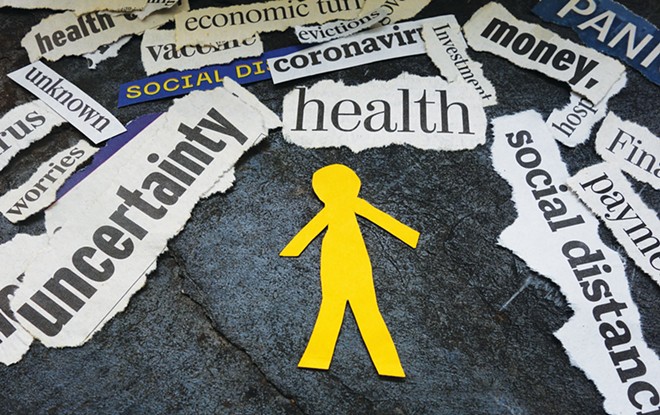"Weary," "Tired of it all," "Over it," are phrases that we all hear due to the pandemic and its constantly moving parameters. Changes have occurred in work settings, school participation, and social interaction due to the coronavirus disease (COVID-19) pandemic, and these adjustments have resulted in high levels of stress. The extended nature of the pandemic has resulted in COVID fatigue, or emotional exhaustion related to potential schedule shifts or threats of illness or quarantine, as well as ongoing or changing mitigation guidelines.
These potential threats to our well-being are real, and having multiple unknowns (e.g., work stability, day care availability, etc.) poses another challenge. Studies have determined that a substantial number of health care workers, students and parents, as well as the general public, have demonstrated at least a moderate level of psychological impact since the COVID-19 outbreak, which began in December 2019. Self-reported well-being during the pandemic decreased significantly in the spring of 2020.
Stress reactions
When under stress, our neurobiological response involves fight, flight or flee. Stressors typically are temporary, and when they continue to be present well beyond initial expectations, a chronicity to the responses occurs. We have not yet experienced a "break," so that our systems can recalibrate. COVID-19's unique challenges affect physical and mental health of individuals.
Mental health concerns result from disrupted routines, increased screen time, and blurred boundaries between work, school and home life. Ongoing stress and uncertainty are related to depression and substance use. Divisions among family and friends regarding attitudes about vaccination and mitigation efforts exacerbate stress.
Physical manifestations of stress include disrupted sleep, fatigue and attention concerns. The American Psychological Association found a range of sleep changes associated with the pandemic, including insomnia, in addition to exhaustion related to long-hauler COVID syndrome.
Personality trait differences
Differences in personality traits have been found to relate to how individuals cope. For example, while conscientiousness and extraversion typically contribute to positive adjustment, studies note that conscientiousness has been found to be positively related, and extraversion to be negatively related, to adhering to government-mandated stay-at-home orders.
While the need for distancing among people appears to affect everyone in complex ways that are dependent on social support and economic stability, extraverted individuals face unique challenges. In addition, the unpredictable nature of COVID-19 does not mesh well with conscientious personality traits; the stress related to uncertainty due to potential exposure, changes to work/home routines, etc. affects daily functioning in another way. Regardless of personality type, active coping has been found to be associated with positive outcomes related to pandemic adjustment.
Managing COVID fatigue
The recognition that we are all experiencing a shared life adjustment due to a public health emergency, despite having different personalities, expectations, pre-existing conditions and social supports, is critical to moving forward. Together, we can help each other by acknowledging that our experiences may individually differ, but this historic pandemic has resulted in communal fatigue. Active coping as a community is warranted, as well as specific strategies for managing COVID fatigue on an individual basis. In addition to seeking mental health counseling if symptoms significantly interfere with functioning, strategies may include:
• Limit media exposure. Taking a break from social media and news outlets may reduce focus on negative or divisive information that exacerbates stress.
• Maintain daily routines. As much as possible, morning routines, mealtime rituals and consistent family schedules are encouraged.
• Get a good night's sleep. Going to bed around the same time every night and waking up around the same time each morning may facilitate an adaptive circadian rhythm.
• Be active. Exercise mitigates effects of stress, and finding an exercise routine can create predictability.
• Express yourself. Using music or art, in addition to having honest conversations, releases stress that we hold.
• Reflect on gratefulness. Focusing on what we have versus what we do not have can mitigate our stress response.
• Connect with others. Even when social distancing, we can connect via technology to maintain relationships. Volunteering or checking on those around us contributes to community vitality that is the antithesis of this pandemic.
Working together to do what we can to end the pandemic is a way to engage in active coping. Showing responsibility for our fellow citizens by following COVID-19 mitigation protocols (e.g., wearing masks, social distancing, getting vaccinated) is actually a way to manage COVID fatigue. Doing something we have control over when it feels overwhelming is a way of reminding ourselves that our autonomous choices really do have an impact.
Melissa Fisher Paoni is a licensed clinical psychologist, with Springfield Psychological Center, LLC.



















